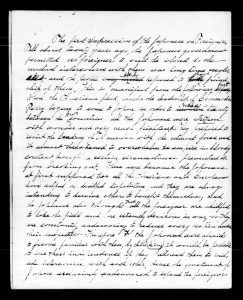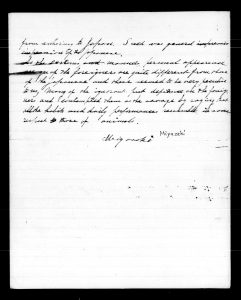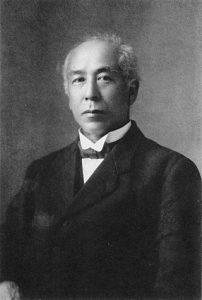Miyazaki

 The first impression of the Japanese on Foreigner
The first impression of the Japanese on Foreigner
(Transcribed by Stephanie Loy and Lavanya Attavane)
“Till about twenty years ago, the Japanese government permitted no foreigner to visit the island, so the mutual intercourse with them was long time neglected and the people openly refused to have friendship of them. This is manifest from the following fact when the American fleet, under the leadership of Commodore Perry began to come to Japan in order to make a treaty between the two counties, all the Japanese were stricken with wonder and very much frightened. They preferred to resist the landing of the Americans with the utmost force and it almost threatened to overwhelm the empire in bloody context though a certain circumstance prevented it from breaking out. These were because the Japanese at first supposed that all the American and European have artful or deceitful disposition, and they are always intending to deceive others to benefit themselves; and the Japanese also thought that all the foreigners are skillful to take the field and are extremely desirous in war, so they are constantly endeavoring to reduce every nation under their subjection. Therefore the Japanese were afraid to become familiar with them, by thinking it would be probable to lose their independence if they allowed them to include intercourse with each other. Hence the government of Japan exclusively endeavored to defend the foreigners from entering to Japan. Such was general impression of the Japanese.
As the customs, manners, personal appearance of the foreigners are quite different from those of the Japanese and these seemed to be very peculiar to me, many of the ignorant just defiances on the foreigner and contempted them as the savage by saying that all the habits and daily performance resemble in some respect those of animals.”
Miyazaki
-
MIYAZAKI MICHISABURO 宮崎道三郎 (1855-1928)
 Born in present-day Mie prefecture. He entered Kaisei Gakko in 1870, and graduated the Law School of the University of Tokyo in 1880. After working for the Ministry of Education, he began teaching law a the University of Tokyo in 1882. From 1884-1888, he studies at a number of universities in Germany, and upon return, becomes a professor at the Tokyo Imperial University. He is the delegate founder of the Nihon University, which was established in 1889.
Born in present-day Mie prefecture. He entered Kaisei Gakko in 1870, and graduated the Law School of the University of Tokyo in 1880. After working for the Ministry of Education, he began teaching law a the University of Tokyo in 1882. From 1884-1888, he studies at a number of universities in Germany, and upon return, becomes a professor at the Tokyo Imperial University. He is the delegate founder of the Nihon University, which was established in 1889. -
Much of Miyazaki’s essay is a recounting of the Japanese-American relationship, starting from Commodore Perry’s “landing” in 1854. He, like most Japanese at the time, thought that the Japanese were suspicious of the Americans and Europeans. But he also reveals that the Japanese were planning to resist the opening with force, but knew that if they fought back the Americans would subjugate them. It is interesting to me that even though the citizens of Japan thought so highly of their country, they were still afraid of their way of life and a strong culture could be threatened by foreigners. However Japan is not the only country that does this, and even America preaches about how great it is, but then says that foreigners are “threats”.
It is also interesting to see Miyazaki thinking so lowly of foreigners, though he is being tutored by a Western missionary. Despite the assumed trust he has in his teacher, he seems to still be very suspicious of the Americans. Miyazaki notes that this mentality was the “general impression of the Japanese,” which would explain why he dwells so much on this subject in his letter. Though he does not mention his age in the writing, we could assume Miyazaki is in his teens or early twenties. For years, before he met any kind of foreigner, Japanese traditions and values were instilled in him, along with ideas of isolation and loyalty to his country. It probably would take more convincing than one foreigner for Miyazaki to believe that Americans could be tolerable. However he separates his feelings from those around him in the last paragraph, where he says he finds foreigners “peculiar,” but others, “contemplated them as the savage by saying that all the habits and daily performance resemble in some respect are of animals.” From this perspective, we could say that Miyazaki was a bit more accustomed to the idea of foreigners in Japan than the people around him.
-
The Japanese student, Miyazaki, writes about foreigners in the same way Japan viewed them during the period of isolation. He talks about the Americans as being deceitful and only wanting to take advantage of Japan to benefit themselves. However, I think that it is important that he is talking about it in a very detached way, and never says that this is his own impression or opinion of the Japanese. He only goes into his own opinion in the last paragraph, saying that the foreigners just seem strange to him and compares them to resembling “animals”. This reminds me of our previous readings in which the Japanese and Americans tend to focus on different things. Americans tend to look at wealthiness while the Japanese tend to highlight tradition and manners. In this same way, Miyazaki states that one of the reasons he saw foreigners as different and strange from the Japanese was because of their different “customs, manner, [and] personal appearance”. He talks about how it is their own daily habits that make them resemble animals, again focusing on manners. I think that this is similar to the Japanese on the first Japanese Embassy to the United States who were extremely surprised to find that the families of the President weren’t documented or well-regarded after the presidency was over, pointing to differences in customs, and the surprise at not having to rehearse before meeting the President, pointing to differences in manners.